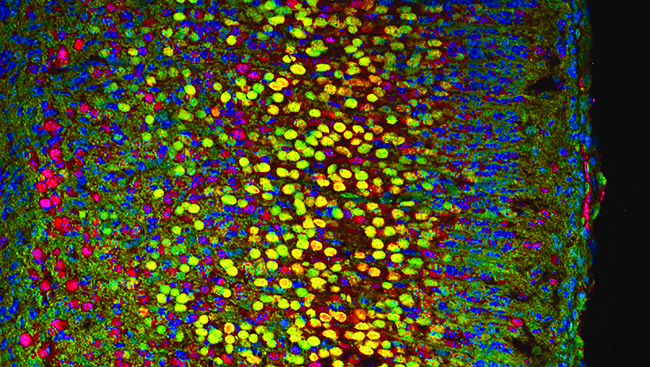What factors determine who faculty members take into a lab?
J. Patrick Card: The answer is simply that he or she knows the student well and often the student has worked in his or her lab for two or more years. We’re very fortunate in the department to have a very vigorous and active major. It attracts really good students who often get into labs early on and develop pretty sophisticated projects. The university here is very supportive of that.
They have a program called First Experiences in Research, which looks for freshmen who are interested in participating in research, helps them find laboratories, and then has weekly mentoring sessions overseen by other faculty at the university. We often, in many cases, end up with really talented individuals who have produced wonderful data in the laboratory. Faculty want this added credential, and it makes good sense for the faculty person to not have to train somebody new, but to be able to continue the line of research without interruption.
Paul McGonigle: At our institution, we have a lot more labs than PhD students in any one year, so even undergraduates are working the labs. So a Master’s student is in between an undergraduate and a PhD student. A lot of labs need a lot of work done and it’s very common to have students of all levels. We even take high school students.
The above Q&A is adapted from the webinar, “What’s in a Master’s? Different Programs for Different Needs.”
Speakers
Paul McGonigle, PhD
Paul McGonigle is the director of the division of interdisciplinary and career-oriented programs within the Graduate School of Biomedical Sciences and Professional Studies at Drexel University College of Medicine. He is also a professor in the department of pharmacology and physiology and director of the drug discovery and development program at Drexel University College of Medicine. McGonigle previously was on the faculty at the University of Pennsylvania School of Medicine and most recently, chief scientific officer and then vice president of PsychoGenics, Inc. McGonigle’s main research interests lie in CNS drug discovery, receptor pharmacology, behavioral pharmacology, and neuropharmacology. He received his BS in mathematics and MS in biomedical science from Drexel University, and he earned his PhD in pharmacology from Temple University Medical School.
J. Patrick Card, PhD
J. Patrick Card is a neuroscience professor at the University of Pittsburgh and is the co-director of the NIH Center for Neuroanatomy with Neurotropic Viruses. He maintains a research program devoted to developing technology for transneuronal circuit analysis using neurotropic viruses and uses that technology to define the functional organization of neural networks that regulate behavioral state and adaptive motivated behavior. He has served on a variety of university committees, including the Provost’s Advisory Council for Instructional Excellence and councils for graduate and undergraduate studies.








